Zero Impact is a company invested in making a difference. Like many of their peers, they have identified the potential for using waste materials in the production of new products. In this case, high efficiency fire logs made from spent coffee.
The problem
Zero Impact has already seen some success. They have identified that coffee consumption is a market which is actively contributing to a large scale ecological problem, and have begun to fill a need by creating a high efficiency fire log product, perfect for home and industrial applications alike.
Now that their business is firmly established, their next objective is improved operations and scaling. Reaching for these goals is what made Zero Impact interested in how a human centred design approach might help them better understand their current and potential customers.
Research
Several potential target markets were identified to be researched by Zero Impact. Our team was specifically tasked with looking into coffee waste producers, and in particular, cafes. Although most of us are coffee drinkers, we were unsure of what the day-to-day reality of a barista or cafe owner looked like in detail, especially with respect to how they manage coffee waste. The first step for us, was go out and speak to the people behind the espresso machines.
76
survey respondents
survey respondents
10
individual interviews
individual interviews
Quantitative research
Whilst our team spoke to cafes in person, we also sent out quick surveys to local baristas and cafe/restaurant owners through social media channels. This provided a clear indication of how these groups managed their waste, how much coffee they dispose of, and also gauged their general interest in ecological initiatives such as the service provided by Zero Impact. A survey was also provided to cafe customers, to determine how much support exists for sustainably minded cafes.
Qualitative research
Our team approached a number of cafes and restaurants in Melbourne's CBD and inner suburbs in order to observe and obtain first-hand accounts of how baristas and cafe owners manage waste, and how this impacts their businesses.
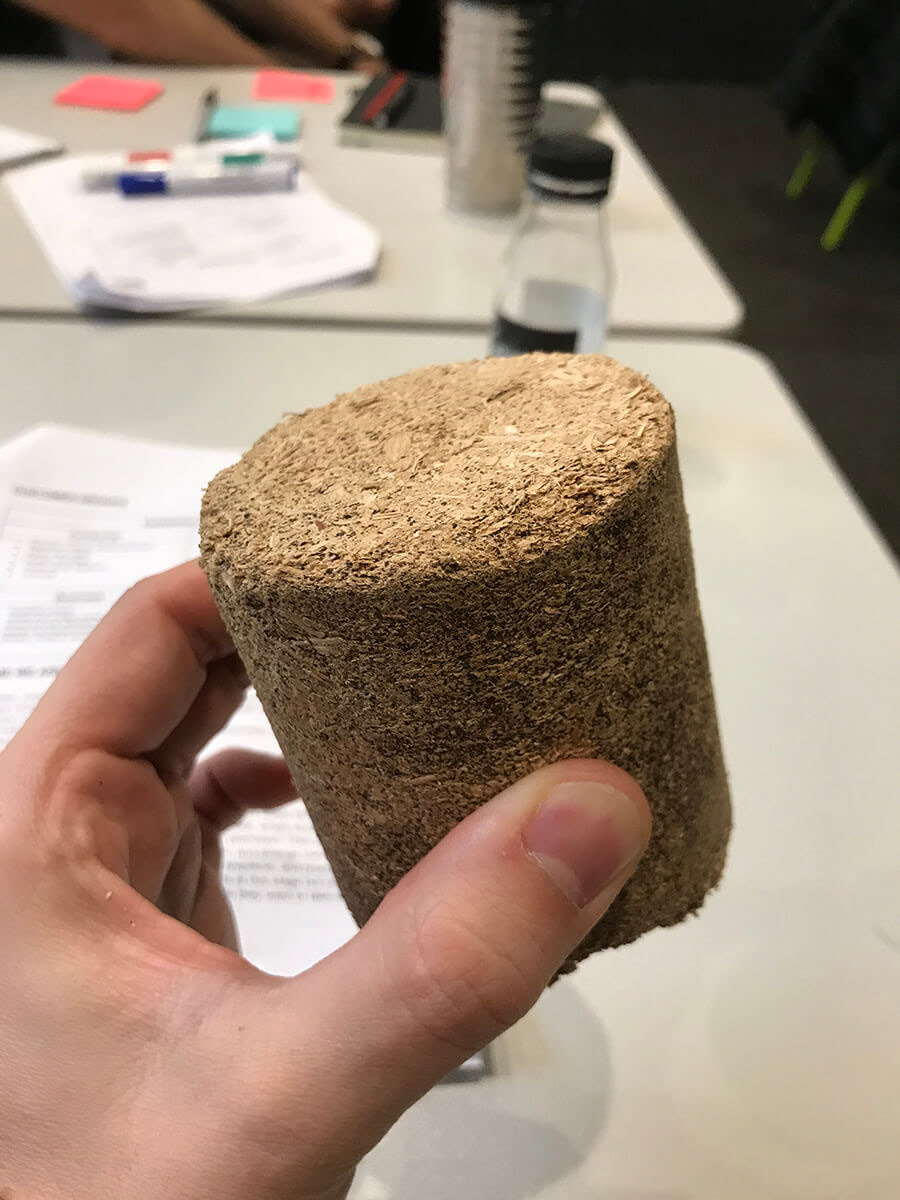
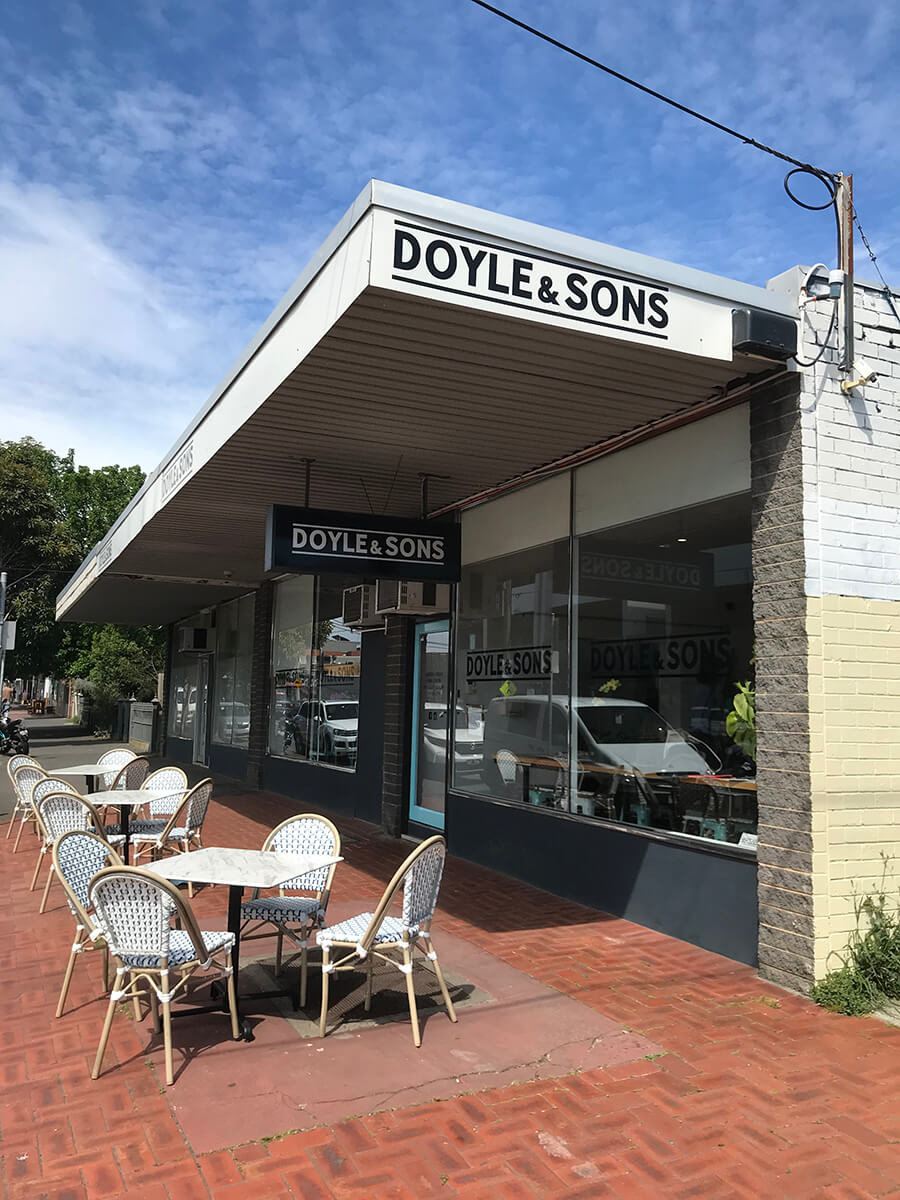
“I already buy recycled napkins and bamboo straws. If you can do something good for the environment, why wouldn't you?”
Nick – Cafe owner, Melbourne CBD
“It should be OK to have a bin in place, but we would have to check with the big boss.”
Adam – Barista, Melbourne CBD
“We've actually tried to get our spent coffee grounds taken away for recycling before, but it was just too much of a hassle.”
Andrew – Barista, Melbourne (western suburbs)
Peer Analysis
A number of related peer businesses were identified in the process of our research, including Reground, a local company who collect coffee waste for use as organic fertiliser. We also spoke to a company in the UK who produce a product called Coffee Logs, which is similar to the fire logs produced by Zero Impact. By reviewing these organisations, we gathered insights into how they marketed their services and engaged cafes, as a point of comparison to Zero Impact.
Synthesis
The results of our one-on-one conversations and survey data were collated and affinity mapped to identify logical groupings, and work out who our priority target audience might be. In the case of cafes, an interesting dynamic between baristas, cafe owners and customers evolved from the synthesis of our data.
Key Insights
In general, the majority of the cafes our team spoke to did not seem to be overly concerned about coffee waste, and didn't feel that it dramatically affected their business. There was certainly a common awareness of the growth in concern for environmental issues, with some baristas and business owners already indicating they had switched to recycled napkins and bamboo straws.
It tended to be the younger baristas, who seemed to be the most in tune with the values of their customers. The trend for cafes who position themselves as sustainable, or fair trade also indicates that there is a growing segment of the cafe market for whom ecologically-friendly practices have become very important.
Personas
The primary persona developed from our research is Spencer. Spencer has been a barista for many years and loves engaging with his customers, especially his regulars. He hopes to open his own cafe one day, but for the time being he is learning the ropes under Carlo, the owner of the cafe where he works. An archetypal customer persona, Helen was also developed as Spencer spends a portion of every day interacting with customers just like Helen.


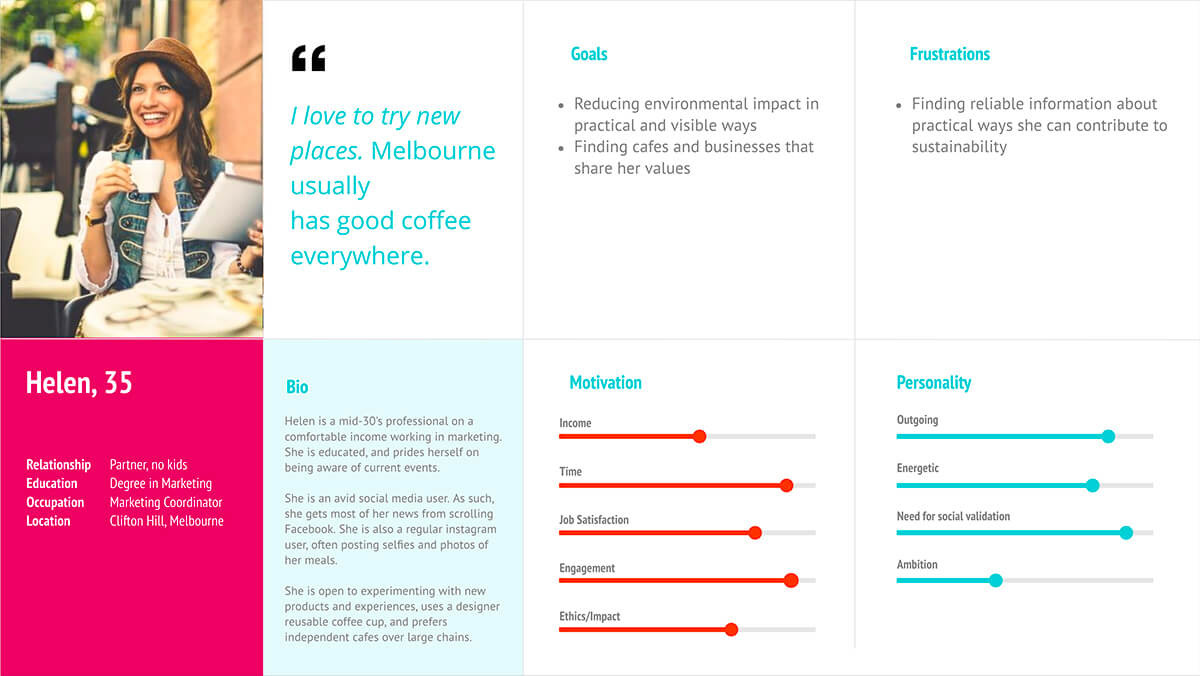
Spencer's Journey
Spencer is pretty switched on to current events and has certainly been aware of the impact on his cafe from recent environmental marches. He hears his regular customer discussing issues around sustainability and the recent restriction on plastic straws. Spencer is interested in services like those provided by Zero Impact, and he has seen sustainable choices such as reusable cups become important to Helen as well. Spencer's greatest challenge is in convincing Carlo (the big boss) that spending money on another service will have a measurable impact on his business.
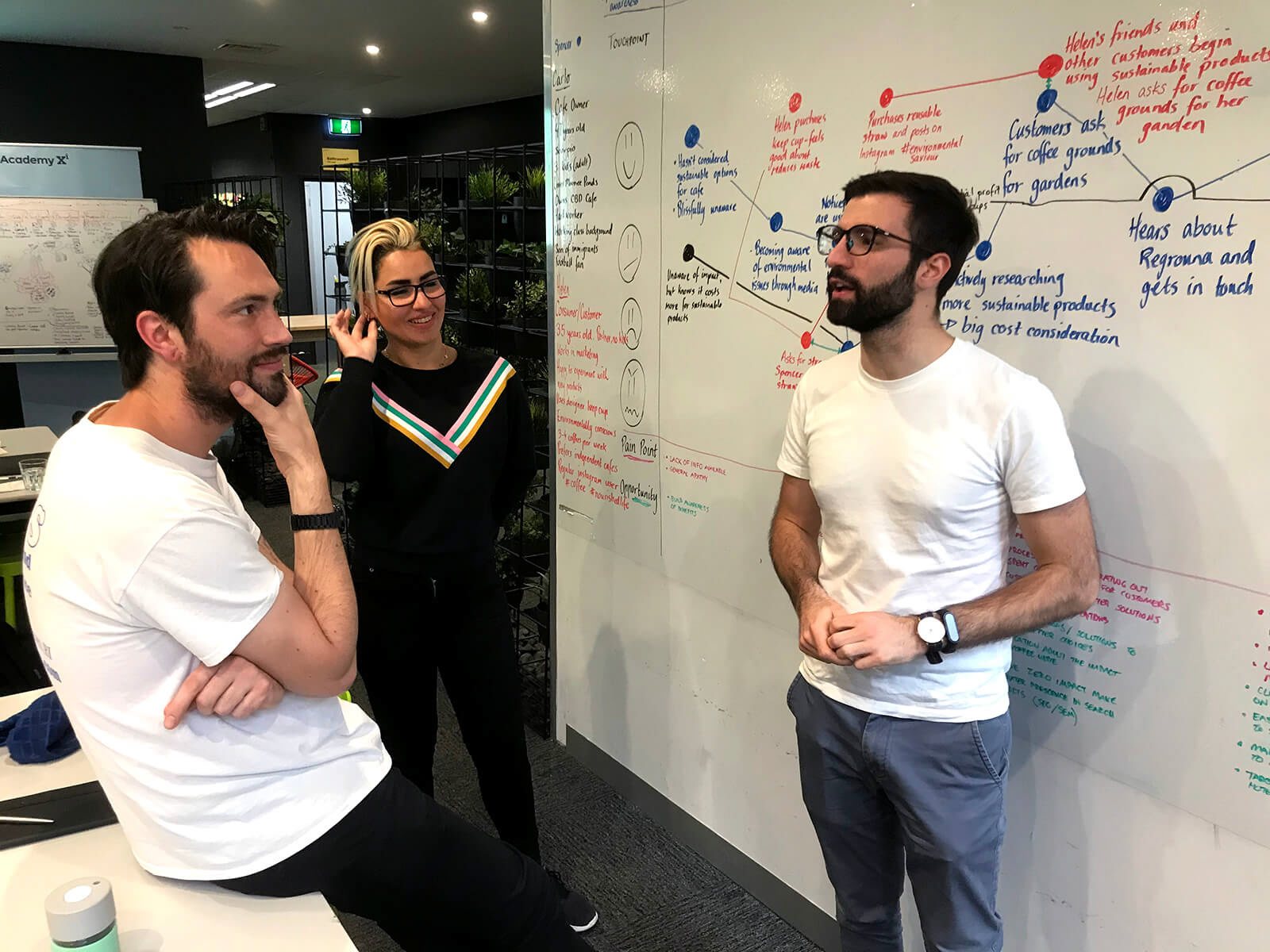
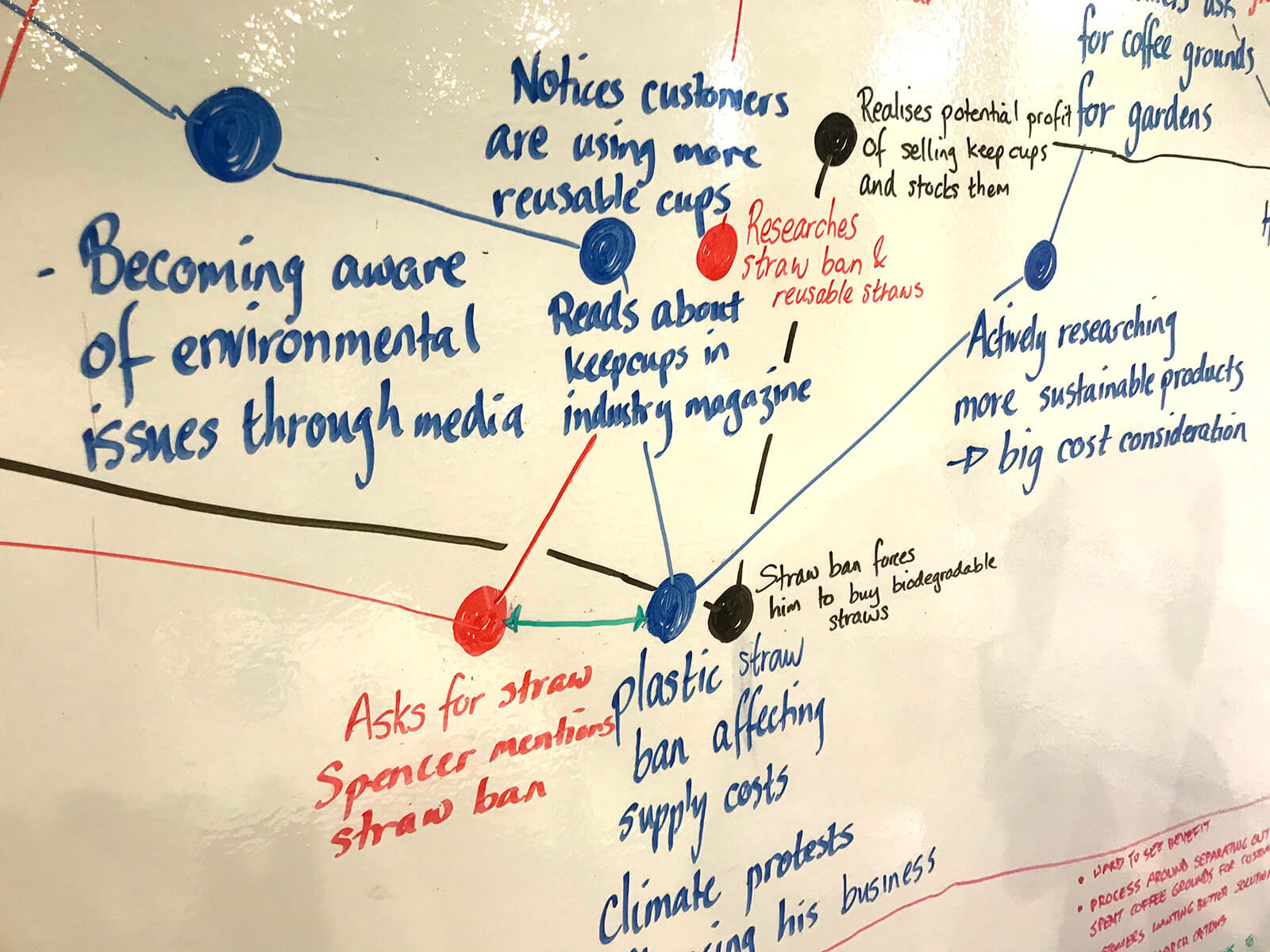
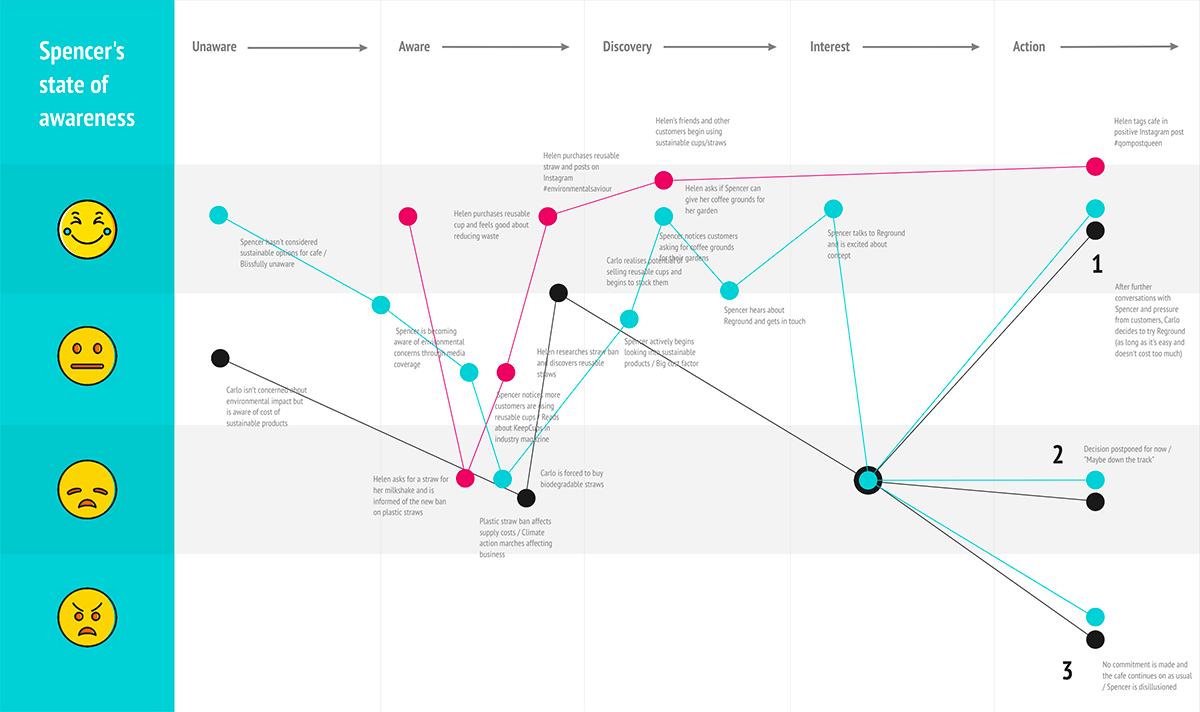
Spencer's pain points
• Spencer struggles to find clear information about the key benefits of Zero Impact, in order to convince his boss that it's something they need to be involved with.
• Spencer regularly encounters customers who ask about where products are made, discuss the new plastic straw ban and increasingly bring their own cups to the cafe.
• Spencer isn't sure how to get involved with Zero impact and the website doesn't seem to have any easy way to sign up.
• If Spencer could convince Carlo to sign up with Zero Impact, no process is currently in place to facilitate this service, and bins aren't currently available.
Opportunities for Spencer
• Build awareness of the product, coffee ground collection service, and clear benefits to both businesses and the environment.
• Nurture customer support of sustainability focused businesses through social media to provide Spencer with advocates to support his desire for positive change.
• Provide onboarding info kits and develop easy-to-use, online enquiry and onboarding processes.
• Design Zero Impact bins and establish easy pick-up service process.
How might we statement
“How might we make it easier for Spencer to learn about and engage with the Zero Impact service in a way that is easy to communicate to his employer?”
Prototyping
In order to empower Spencer to advocate for the benefits of Zero Impact to Carlo, a more succinct set of benefits needed to be effectively communicated and a seamless, hassle free process for engagement would also be required. Enabling a beginning-to-end, information-to-action process is what our ideation and prototyping process focused on.
Ideation
We began with the conception of a number of subordinate 'How Might We' statements in order to explore what our detailed focus should be. For each of these questions, our team looked at various aspects of the Zero Impact-to-cafe relationship and potential workflow. By ideating around topics such as who would be involved, technology required, operational logistics, communication and assets required, we were able to work out what could likely be involved in a full service process.
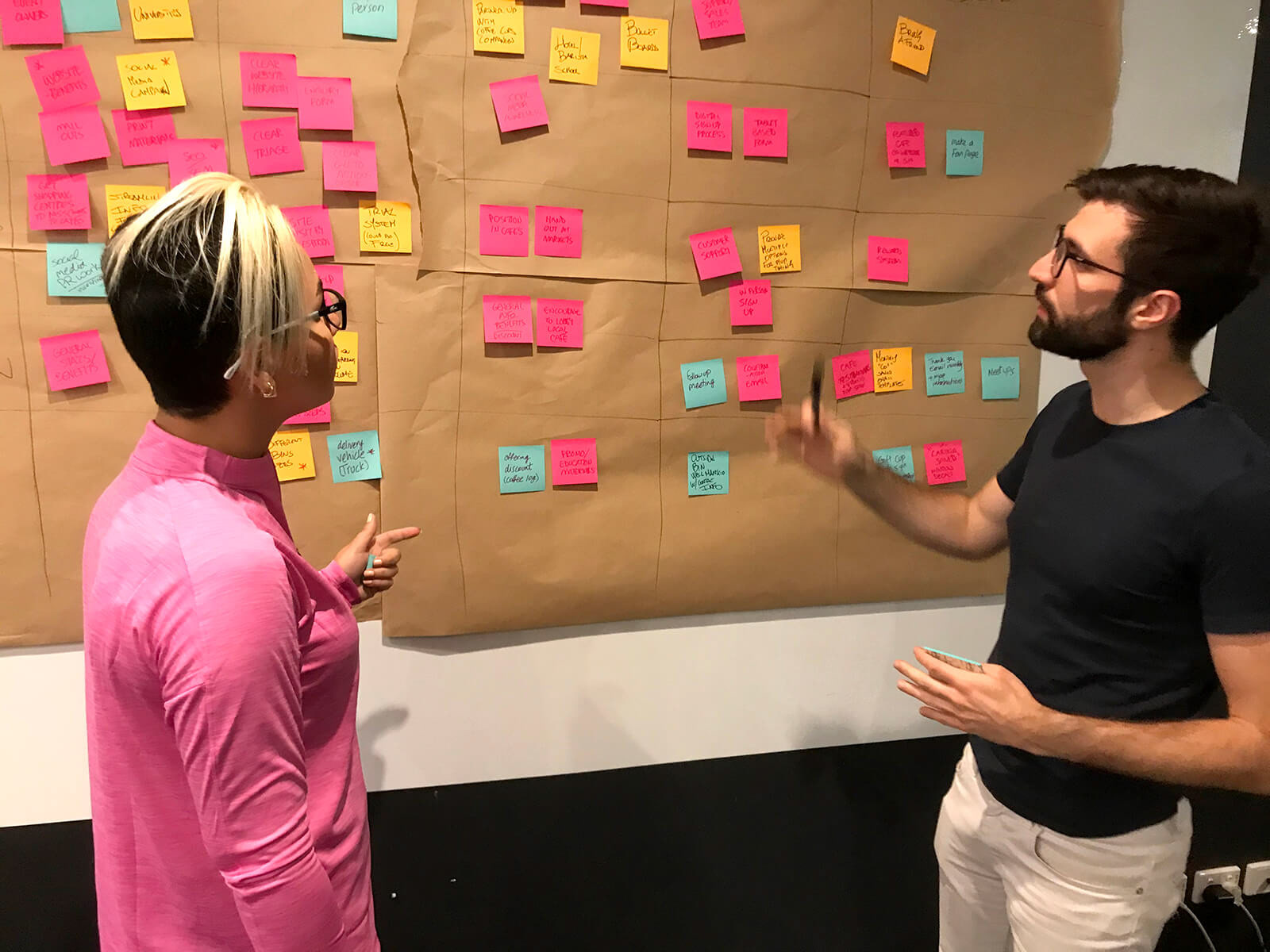

Minimum viable product (MVP)
To fully realise this kind of workflow, a comprehensive information campaign and service design process would later be critical, but for our part in this project, improvements to Zero Impact's current digital platform were the most viable area of concentration. Those ideas that supported this approach and would provide immediate value to the business were prioritised through a minimum viable product matrix.
Low fidelity prototyping
Our primary area of concentration included the refinement of key benefits information on the Zero Impact homepage, along with a clear triage for cafes and other target customer groups, and a cafe specific section of the site.
The tailored cafe information had to include a number of priority information areas, including easy to understand benefits, a process diagram, social proof in the form of testimonials and/or video content, and clear calls-to-action to an expression of interest form. Concept sketching on white boards, allowed for quick testing, manipulation and refinement of our initial layouts.
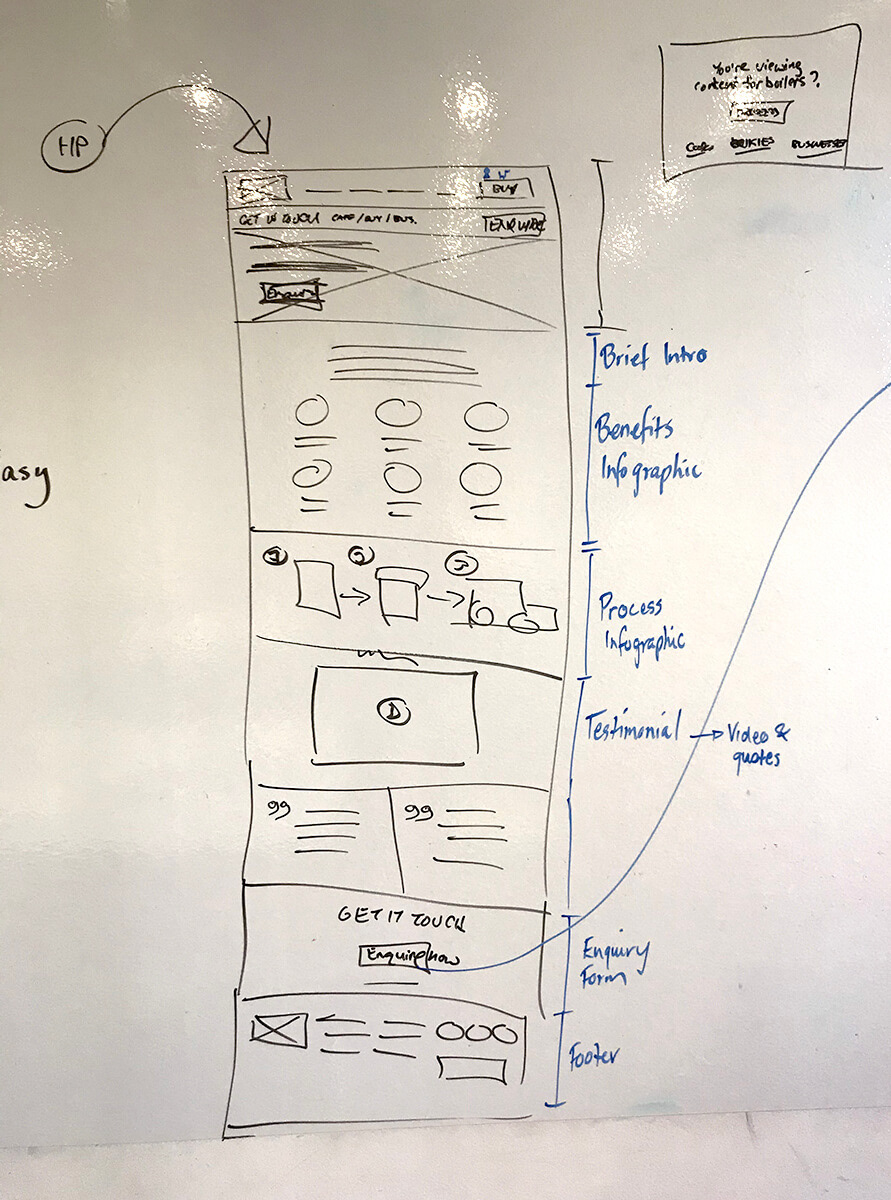

Medium fidelity prototyping
Once initial feedback had been acquired on our basic page structures, we progressed to detailed medium fidelity layouts. Without getting hung up on visual design details, these greyscale structural designs allowed our team to ensure all the relevant content was displayed in an easy-to-understand way. This was then validated by setting up click-through prototypes in Figma and testing the flow of these pages with real baristas, some of whom we had interviewed in the research phase.
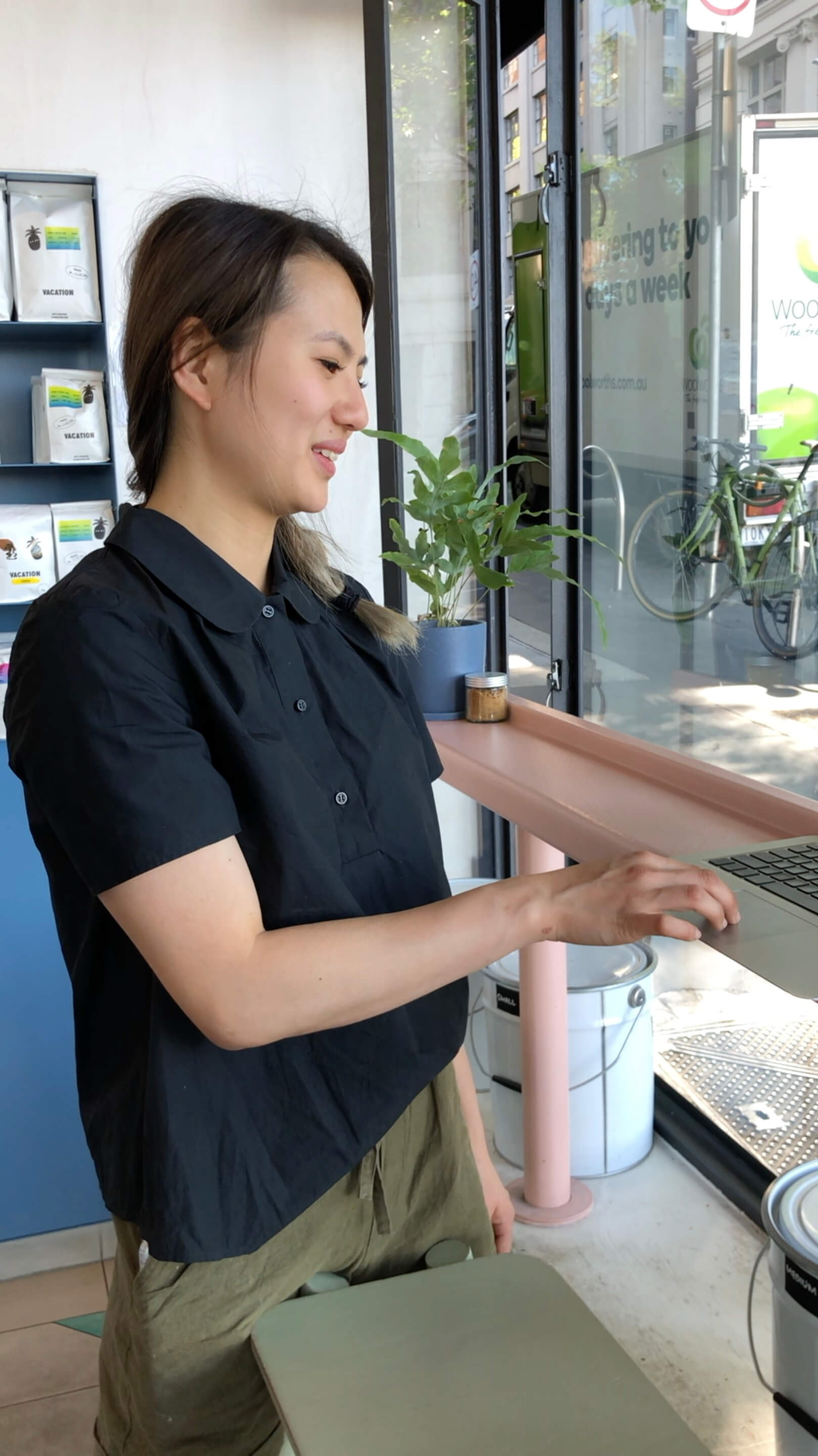
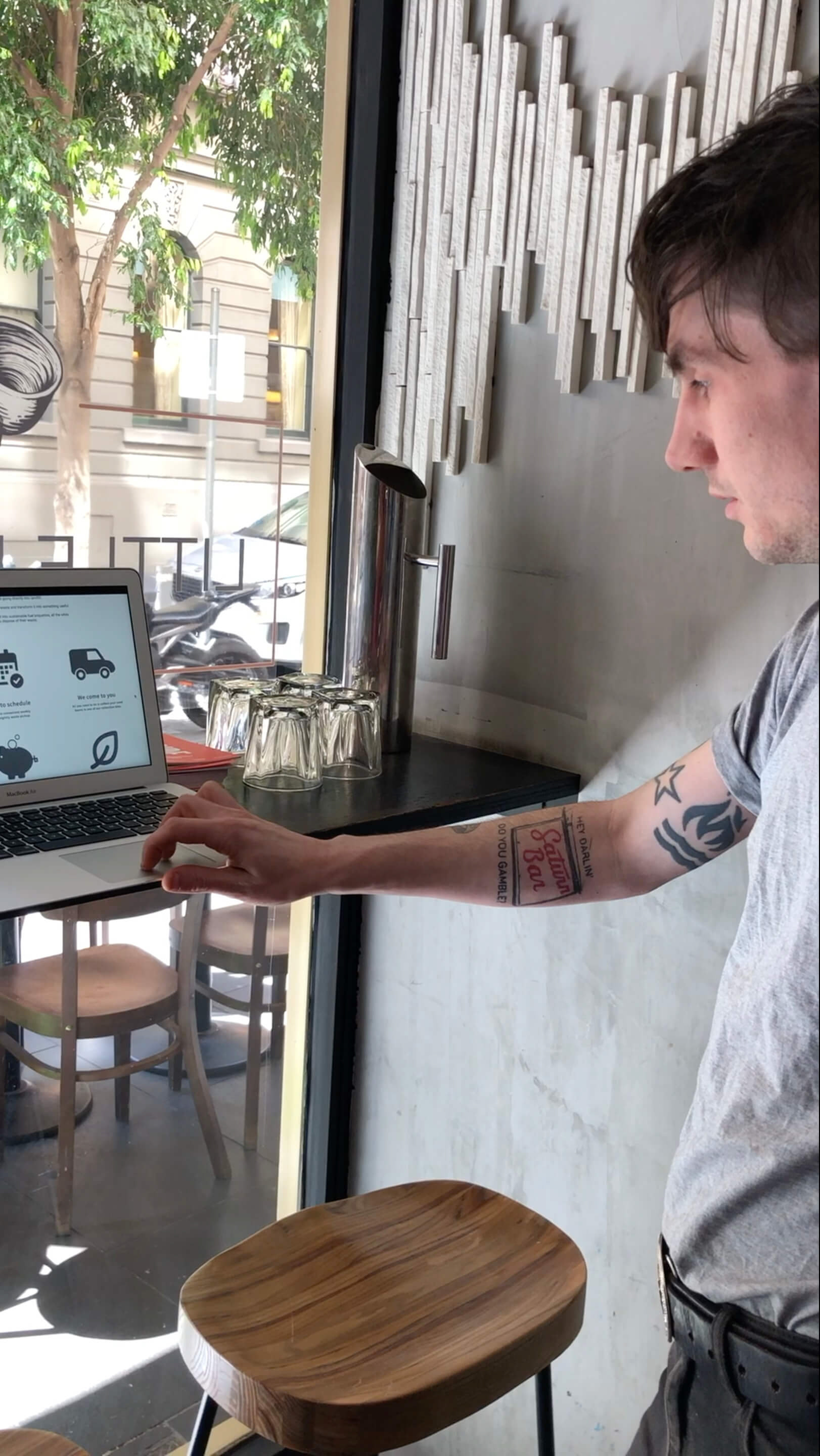
High fidelity prototyping
Iterating and testing through a number of versions ensured our medium fidelity wireframes presented all the necessary information in the most effective way possible.
Other teams on this project had been tasked with researching and designing for other target audiences, so as a final phase to this project, Zero Impact's existing visual identity guidelines were used to create high fidelity versions of the our prototype, along-side relevant pages for each target group.
Typography, imagery and colour were updated from the current website, as necessary, to ensure that these element served clear messaging and information hierarchy for Spencer and the other primary personas developed by our colleagues.
Outcomes and next steps
The primary objective of this project was to gain insight into the needs of a number of key target audiences for Zero Impact. It was also important to generate as many feasible and actionable concepts as possible, from both user experience and service design points of view. Further research and design are required to fully realise the potential identified in this project. Recommendations for next steps are as follows.
Next steps
• Generate awareness and understanding of benefits with clear educational marketing for cafes.
• Activate cafe customers who have an appreciation for eco-friendly initiatives.
• Add triage functionality to the website with targeted information for cafes and other target audiences, funneling potential cafe customers through clear calls-to-action.
• Optimise website SEO for search by individual customer segments.
• Provide a hassle-free digital enquiry and onboarding/registration workflow.
• Further develop brand personality to ensure company values resonate with customer benefits.
• Ensure positioning copy focuses on clear benefits rather than just environmental problems.
“Social enterprises are another great motivator for me, and in lieu of something nearby that's sustainable, I would put my efforts into trying to find a place like this that still shares my values.”
Anonymous – Cafe customer survey respondent
Like what you see? Get in touch and let's start a conversation.




